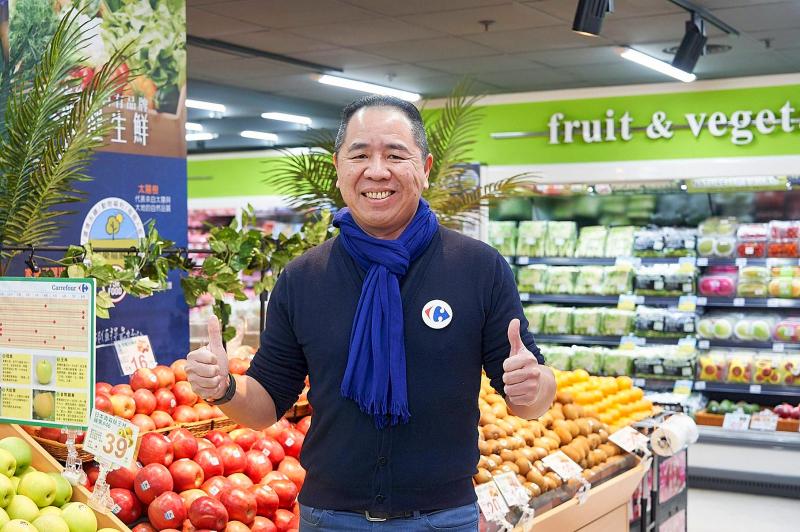Carrefour Taiwan (家樂福) yesterday finalized the purchase of Wellcome Taiwan Co (惠康百貨), bringing all Wellcome supermarkets and Jasons Market Place stores nationwide under its brand, the hypermarket chain operator said as the first converted Wellcome store reopened as a Carrefour outlet in Taipei.
The company expects to convert Wellcome stores to Carrefour supermarkets at a rate of 36 to 40 a month and complete the conversions nationwide by August, Carrefour Taiwan president Wang Chun-chao (王俊超) said.
Wellcome Taiwan, which was launched in 1987 by Hong Kong-based Dairy Farm International Holdings (牛奶國際控股), was Taiwan’s largest supermarket chain, before French hypermarket chain Carrefour SA in June last year announced its acquisition.

Photo courtesy of Carrefour Taiwan
The deal includes 199 Wellcome supermarkets, 25 Jasons Market Place stores and a warehouse in Taoyuan, Carrefour Taiwan said.
Same-store sales for converted Wellcome stores are expected to grow 10 to 15 percent after coming under the Carrefour banner, Wang said.
The first converted store is on Taipei’s Dunhua N Road, covering 200 ping (661m2).
It is the first Carrefour supermarket in Taiwan that features a coffee shop, a dining area and kitchen facilities, the company said, adding that another Wellcome store is to reopen as a Carrefour supermarket today in Nangang District (南港).
However, the high-end Jasons Market Place stores would continue to operate under their own name for another two years, he said.
People with Wellcome loyalty cards can transfer their points to Carrefour’s loyalty card program, while former Wellcome employees would see their seniority and salary levels carry over, Wang said.
Carrefour currently operates 66 big-box hypermarkets and 66 supermarkets in Taiwan. With the acquisition of Wellcome, that number is to rise to 66 big-box hypermarkets, 262 supermarkets and 25 Jasons Market Place stores.
Carrefour Taiwan has set a revenue target of NT$90 billion (US$3.2 billion) for this year, NT$20 billion of which is expected to come from the former Wellcome stores, Wang said.
“The Wellcome group has cultivated the Taiwanese market for 34 years, and this deal is an alliance of two strong partners,” he said.
Carrefour Taiwan said once all the Wellcome supermarkets have been converted to its brand, it would work on e-commerce and store pickup services to better serve its customers.
Carrefour Taiwan’s headcount would increase from 14,000 to 17,000 employees, Wang said.

CHIP RACE: Three years of overbroad export controls drove foreign competitors to pursue their own AI chips, and ‘cost US taxpayers billions of dollars,’ Nvidia said China has figured out the US strategy for allowing it to buy Nvidia Corp’s H200s and is rejecting the artificial intelligence (AI) chip in favor of domestically developed semiconductors, White House AI adviser David Sacks said, citing news reports. US President Donald Trump on Monday said that he would allow shipments of Nvidia’s H200 chips to China, part of an administration effort backed by Sacks to challenge Chinese tech champions such as Huawei Technologies Co (華為) by bringing US competition to their home market. On Friday, Sacks signaled that he was uncertain about whether that approach would work. “They’re rejecting our chips,” Sacks

NATIONAL SECURITY: Intel’s testing of ACM tools despite US government control ‘highlights egregious gaps in US technology protection policies,’ a former official said Chipmaker Intel Corp has tested chipmaking tools this year from a toolmaker with deep roots in China and two overseas units that were targeted by US sanctions, according to two sources with direct knowledge of the matter. Intel, which fended off calls for its CEO’s resignation from US President Donald Trump in August over his alleged ties to China, got the tools from ACM Research Inc, a Fremont, California-based producer of chipmaking equipment. Two of ACM’s units, based in Shanghai and South Korea, were among a number of firms barred last year from receiving US technology over claims they have

It is challenging to build infrastructure in much of Europe. Constrained budgets and polarized politics tend to undermine long-term projects, forcing officials to react to emergencies rather than plan for the future. Not in Austria. Today, the country is to officially open its Koralmbahn tunnel, the 5.9 billion euro (US$6.9 billion) centerpiece of a groundbreaking new railway that will eventually run from Poland’s Baltic coast to the Adriatic Sea, transforming travel within Austria and positioning the Alpine nation at the forefront of logistics in Europe. “It is Austria’s biggest socio-economic experiment in over a century,” said Eric Kirschner, an economist at Graz-based Joanneum

France is developing domestic production of electric vehicle (EV) batteries with an eye on industrial independence, but Asian experts are proving key in launching operations. In the Verkor factory outside the northern city of Dunkirk, which was inaugurated on Thursday, foreign specialists, notably from South Korea and Malaysia, are training the local staff. Verkor is the third battery gigafactory to open in northern France in a region that has become known as “Battery Valley.” At the Automotive Energy Supply Corp (AESC) factory near the city of Douai, where production has been under way for several months, Chinese engineers and technicians supervise French recruits. “They